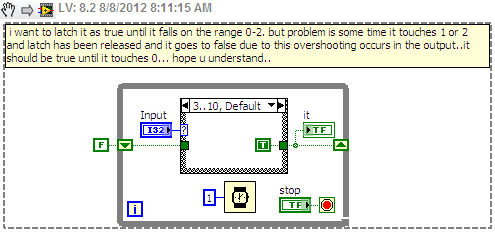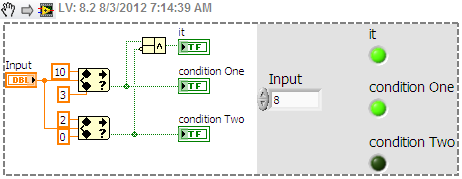-
Posts
951 -
Joined
-
Last visited
-
Days Won
39
Content Type
Profiles
Forums
Downloads
Gallery
Posts posted by jcarmody
-
-
Here's something you can try. I just got it working this afternoon and haven't tested it enough since drastically changing the approach.
- unzip the attachment into <LabVIEW>\project
- restart LabVIEW
- put a "requirements.txt" file in the folder with your LabVIEW project
- the first line must be the name of the top-level VI (as a relative path from the project's folder)
- the second line must be blank
- the third and subsequent must be the requirement ID followed by a tab then the requirement description
- put free labels in your VIs in the form of [Covers <id>]
- the first line must be the name of the top-level VI (as a relative path from the project's folder)
- run Requirements Hatchway from the Tools menu
- profit
Tell me how it goes.
By the way - this is only in LabVIEW 2012 because I can't manage to save it to a previous version. All I get is a folder with its dependencies, but no main VI. I'll try from home in case this is an issue with my installation.
- unzip the attachment into <LabVIEW>\project
-
I've made CaseSelect into a Quick Drop plugin - https://decibel.ni.com/content/docs/DOC-24058
-
 1
1
-
-
We have your blog in our feed-readers anyway.

-
-
-
Very cool.

-
I've seen that, only the line was black and there were fewer data points.
Somehow my mind wandered from here to an old Isaac Asimov short - The Feeling of Power
[...]"Yes. I know," said the little Technician earnestly, "but I start by saying seven times three because that's the way it works. Now seven times three is twenty-one.
"And how do you know that?" asked the congressman.
"I just remember it. It's always twenty-one on the computer. I've checked it any number of times."
"That doesn't mean it always will be though, does it?" said the congressman.
"Maybe not," stammered Aub. "I'm not a mathematician. But I always get the right answers, you see."
"Go on."
I made some progress last night re-reading the material and reviewing some of the lectures, but I may always feel like this technician.
 There was an instant's silence and then General Weider said, "I don't believe it. He goes through this rigmarole and makes up numbers and multiplies and adds them this way and that, but I don't believe it. It's too complicated to be anything but hornswoggling."
There was an instant's silence and then General Weider said, "I don't believe it. He goes through this rigmarole and makes up numbers and multiplies and adds them this way and that, but I don't believe it. It's too complicated to be anything but hornswoggling." -
Sounds like your course is using Sedgewick's book.
Yes, Sedgewick is using his book for this course.
Maybe there would be demand for my half-written book after all.I'd read it.
-
I appreciate the condolences. Even when it's "expected" it's never really expected.
Anywho, all I've really been missing in the past to take my CLD (other than the CLAD
 ) is some current hardware experience. So hopefully I can fit the CLAD/CLD/CLA exams in sometime before the end of the year.
) is some current hardware experience. So hopefully I can fit the CLAD/CLD/CLA exams in sometime before the end of the year.You don't really need any hardware experience for the CLD. And, I FTFY.
-
 1
1
-
-
I understand the things you've both written. I also think that I understand that a brute-force approach to the "Three Sum" problem is ~N^3 because it nests loops and operates N*N*N times. I guess I understand that expanding a binary search process will lead to 'log N', but I'd only be guessing and accepting some maths that I've either forgotten or never learned.
I'm studying Union-Find algorithms this week, too. The programming assignment involves solving a percolation problem. I haven't read the problem statement, but the lectures introduced the concept and I believe I can implement an efficient algorithm because the lecture told me that the "weighted quick-union with path compression" is the best approach.
I should probably discuss this in Coursera's forums but I like the people here so much!
 I'm going to keep plugging away on the off chance that something will click and I'll learn something. Thanks for your comments.
I'm going to keep plugging away on the off chance that something will click and I'll learn something. Thanks for your comments. -
Algorithms Part 1 began today...
What do you call a programmer that doesn't understand order-of-growth calculations? Hopeless?
-
You're welcome; I hope you stick around and enjoy/enrich LAVA.

-
Perhaps this? It will be True after the input goes above 3 and will go False if the input = 0. It won't change if the input is 1 or 2.
-
 1
1
-
-
[...]
I am dealing with a customer who is different than the ones I had before. He likes to take all the block diagrams but refuse to pay once he has got all the code. [...]
Fool me once...
-
I don't understand what you mean by 'latch'. It sounds like you want to ignore the occasional error when the input comes to zero (0-2) and keep the output True, but for how long? Perhaps you mean that whatever condition exists at the beginning of execution should persist throughout. Do you want the output to be True if it begins between 3 and 10 and never go False, regardless of changes in the input?
-
If condition one falls on the range 3 to 10 then it should be latched as True no matter what then.
if condition two falls on the range 0 to 2 then it should be latched as False and has to reset the condition 1 and vice versa .
What shoud the output be when the input is less than 0, between 2 and 3 or greater than 10?
-
-
[...] I even managed to mess up the test suite function that would have told me that it wasn't yet fixed. [...]
My company sometimes takes this approach with design flaws that would be too expensive to fix.
-
I'm not able to get this to work (LV2011, SP1, WinXP with Microsoft Speech SDK 5.1 installed). I don't get any errors, it just doesn't detect when I say something from the list. In addition, when I press the Stop button, Release Session.vi never finishes. If I enabled debugging it will finish, and LabVIEW crashes if I abort it. I wonder if this behavior offers any clues into my bigger problem of not recognizing speech.
-
I've "sold" three of the technicians I work with on this package; I wonder if they want my job. (They can have it
 )
) -
That's the first thing I though about after posting the link. The OP doesn't reveal a location so I couldn't know if it would help.
-
You get an arduino as an added bonus! I bought it for my twelve-year-old son to learn on.
-
Even better than second-hand - http://www.sparkfun.com/products/11225
-
 2
2
-
-
Have you taken the Udacity CS101 class?
No. It looks interesting, though, and I may preview the class to see how they build a web crawler. I had played with Python before and have been able to google answers to the questions I've had.
I took the CS101 then CS212 class
That looks like one I'd need to take. How far did you get and what did you think of it?
How does Coursera compare?
It hasn't started yet.







Requirements Hatchway
in Code In-Development
Posted
It's not finding [Covers <id>] tags in dynamically dispatched VIs saved in an llb.